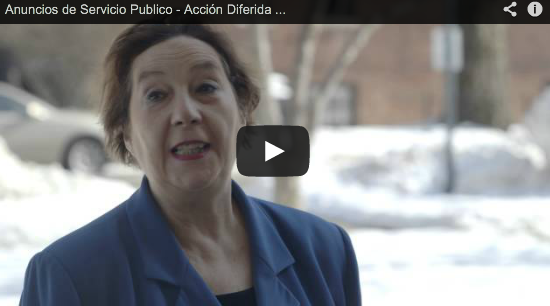An Asylum & Immigration Law Clinic Deferred Action for Childhood Arrival (DACA) public service announcement video recently debuted on American Spanish language broadcast television network Telemundo. The 31-second spot "Window Washing," aired on July 9 and continued for a two-week period.
The PSA is one of four recently developed and produced by students and faculty of
DePaul University’s Jarvis College of Computing and Digital Media, in coordination with clinic students and under the direction of Clinical Instructor Sioban Albiol.

Three additional public service announcement videos—one in English and two Spanish—encourage undocumented immigrants who may qualify for DACA to find out more from reliable sources.
Introduced in August 2012, DACA provides eligibility for work authorization and a valid social security number for certain undocumented immigrants who came to the United States as children. While the benefits of the program are “tremendous,” Albiol said, “the announcement created significant issues and demand for services.”
Getting the message out
In coordination with clinic community partner Marcy Gonzalez of Latinos Progresando (LP), Albiol identified a need for reliable information on the specifics of DACA. Gonzalez, director of the Immigration Legal Services Program at LP, told Albiol that she often heard clients repeat inaccurate information gleaned from radio or TV.
Albiol approached College of Computing & Digital Media Visiting Associate Professor Jose Soto about directing a series of public information commercials for DACA to present clear and accurate information and establish the clinic as a source for information. Soto and his TV production students pitched ideas to Albiol and Gonzalez and developed scripts for the videos.
The project's DACA specialist, Michael Santomauro (JD ’13), now in private practice at Santomauro Law, contributed script feedback and maintained project momentum. Helen Albrecht, a senior majoring in digital media, took on the role of producer of the videos.
"Taking on the challenge of producing the PSAs was an amazing experience," said Albrecht. "I along with others in the crew have never had the opportunity to work on a production of this scale. Being Hispanic it was not only important for me to produce these PSAs as a Digital Cinema student, but also to get the message of DACA across for any immigrants who might be looking for more information.
"We struggled and we struggled and we finally got everything organized and put it together," she said. "We have very fond memories."
An online resource
A link at the end of the videos refers viewers to the Asylum & Immigration Law Clinic resource website, which Legal Clinic Clerk Lorena Hernandez and Paralegal Esmeralda Villela developed with the College of Law's Office of Communications.
"It's our hope that our page becomes a reliable resource for the public to access information on immigration," said Albiol. She hopes the site will not only correct misunderstandings but also continue to direct people to reliable sources. The clinic will measure impact through website traffic and click-through-rates and invite clinic partners to post information sessions and workshops on a public calendar.
"We hope to soon have the PSAs distributed to CANTV and a couple of other networks," said Hernandez.
Ultimately, the DACA PSA project coincided with the end of the DePaul quarter and the announcement of DACA renewal. Albiol called it “an opportune time to get the PSAs out to the public.”
The videos were possible thanks to the support of DePaul's Vincentian Endowment Fund.